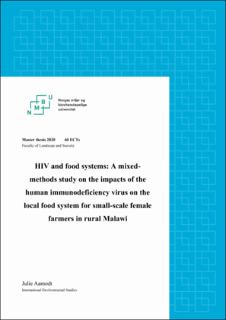| dc.description.abstract | HIV and food insecurity continue to be two of the leading causes of morbidity and mortality in Malawi, and throughout sub-Saharan Africa. Food insecurity threatens progress towards ending the HIV epidemic, and HIV threatens the ability of food systems to provide food security and incomes for rural populations in Malawi. Therefore, this study aims to identify the effects of HIV on the food system for small-scale female farmers in a resource-constrained setting in rural Malawi and to explore how informal and formal coping strategies influence this relationship. The study employs a mixed-methods approach using semi-structured interviews, focus groups, key informant interviews and statistical analysis. Findings from this study demonstrate that HIV impacts several components of the food system, including primary agricultural production, market access and consumer behaviors. Respondents were particularly concerned with the effect that HIV had on their strength, despite taking antiretrovirals. However, the data shows a slightly less dark picture of the impacts of HIV on the food system compared to previous studies, suggesting that the lives for women living with HIV in rural Malawi has slightly improved. Some women emphasized that other issues related to living in poverty were more challenging compared to HIV. Although there is a large diversity in experiences, there are two key pathways through which HIV affects the food system for small-scale farmers in rural Malawi: (1) the deterioration of livelihoods through impacting the ability of women to participate in agricultural work, or (2) positive behavioral changes in the form of changed diets and food safety practices through increasing access to health education, adherence to antiretroviral therapy and motivation amongst the women to improve their health and quality of life. | en_US |

